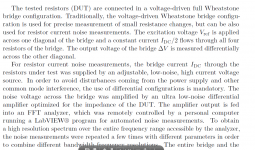Read this..
The anode of a valve /tube is made from..
<a name=top>The Basic Technical Aspects of Valves</a>
Regards
M. Gregg
The anode of a valve /tube is made from..
<a name=top>The Basic Technical Aspects of Valves</a>
Regards
M. Gregg
this warning came up wthIs this the one?
I will have a read..🙂
https://dcc-llo.ligo.org/public/0002/T0900200/001/current_noise.pdf
Regards
M. Gregg
proceed or "get me out of here"
dcc-llo.ligo.org uses an invalid security certificate.
The certificate is not trusted because no issuer chain was provided.
(Error code: sec_error_unknown_issuer)
Maybe Merlin meant to say/type micro-ohms?Steel certainly has higher resistivity than copper, but so what? We're talking about a few milliohms difference in a typical wire length, and since it will be in series with any number of deliberate resistors in circuit, what different would a "slightly resistive" wire make? If anything it would improve metters, because the bulk wire resistance will be more "perfect" than that of actual resistors.
this warning came up wth
proceed or "get me out of here"
Its a PDF..
here are a couple of screen shots..
Perhaps you can down load from here?
https://dcc-llo.ligo.org/public/0002/T0900200/001/
Regards
M. Gregg
Attachments
Last edited:
I asked Firefox to add an exception to allow the pdf to download.If you understand what's going on, you can tell Firefox to start trusting this site's identification. Even if you trust the site, this error could mean that someone is tampering with your connection.
I have auto scan on downloads.
Kaspersky..anti-malwarebytes...spybot..system guard ...etc
I'm not very trusting either..😀
It could be because its a Linux server..
Regards
M. Gregg
Kaspersky..anti-malwarebytes...spybot..system guard ...etc
I'm not very trusting either..😀
It could be because its a Linux server..
Regards
M. Gregg
Last edited:
The logic error you are making is that you equate resistance with sound quality.
Jan
Yes, and resistivity of material is an issue ... the higher, the worst 😉
Yes, and resistivity of material is an issue ... the higher, the worst 😉
The first post in this thread asserts that replacing a component with a higher resistance improved the sound quality, so what is it? 🙄
Well, I for argue sake i put the original resistors back in and for sure the amp sounded muffled lacking high end detail and bass respons went down. Took them out again and put the Allen Bradleys back in and the amp sounds great, with great high end detail and beautiful deep bass response.
I think its a sum of the parts. Its a noticeable improvement.
Did you try just one new AB at the original value 390K resisitor as a test? Or any common 390K would do just to check for a defective original.
20
Misunderstanding : not higher resistance, higher wattageThe first post in this thread asserts that replacing a component with a higher resistance improved the sound quality, so what is it? 🙄
Yes, and resistivity of material is an issue ... the higher, the worst 😉
So a resistor of say, 100,000 ohms with end leads of another 0.003 ohms sounds definitely better than a 100,000 ohms resistor with end leads of another 0.005 ohms? Just checking. 😉
Jan
yes : a reason why SMD components show less noise than through-hole components ...( a less solder joint too )
Care to show data or run a basic noise calculation to demonstrate the significance of this remarkable claim?
Carbon is even a worse conductor. Yet van den Hul can't make 'm fast enough. An interlink with 28 ohms resistance. Makes steel look like a superconductor!
The logic error you are making is that you equate resistance with sound quality.
Jan
Sorry for the lack of clarity. I meant to say that a steel conductor is inferior in sound quality to an otherwise similar copper conductor, and not that steel is bad because it is more resistive. I've found this from my own experience with cables and various electronic parts, and suspect that most here actually agree.
Well that's OK then. Luckily, humans don't have a propensity for mass delusion.and suspect that most here actually agree.
On UFO buff websites, you can undoubtedly get many people to agree on the reality of alien abductions and anal probes, with exactly the same quality of evidence that you're presenting.
I can see various folks reaching for an old metal coat hanger, a wrench, screw drivers, scissors, silver wire, OFC copper, and is that Sy grabbing a potato all to see which sound better... there is a whole thread on this subject somewhere here.
I can see various folks reaching for an old metal coat hanger, a wrench, screw drivers, scissors, silver wire, OFC copper, and is that Sy grabbing a potato all to see which sound better... .
Yes...but have you tried a potato cut in half with mylar between it, there is no doubt it is an organic capaci-tator..😀
But which variety sounds the best? The diy home grown or the industrial spud? The chip capacitor..(potato in oil type)
Did you know that if you use two potatoes with different metal electrodes you can generate enough power to light an LED?
Regards
M. Gregg
Last edited:
On UFO buff websites, you can undoubtedly get many people to agree on the reality of alien abductions and anal probes, with exactly the same quality of evidence that you're presenting.
Well, there certainly are measurable differences. Steel has hysteresis and is usually magnetic (except for special types). This may be a reason that steel conductors have a different sound quality than copper. Of course, some may not agree that there is a difference anyway., but that's what makes horse races.
- Status
- Not open for further replies.
- Home
- Amplifiers
- Tubes / Valves
- Resistor question


